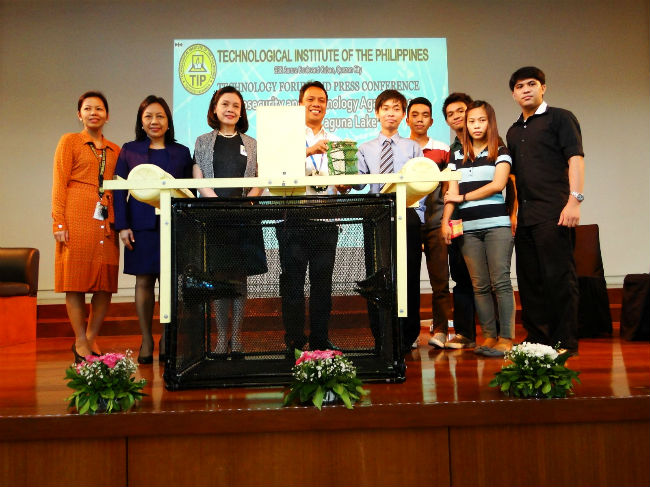
TIP encourages its engineering students to make a difference. In photo are TIP student inventors who developed a device to protect the fresh water fish population from the dangerous knife fish in Laguna Lake. Shown with the students here are (L-R) Shearyl Arenas, TIPQC Electronics Engineering chair; Dr. Cynthia Llanes, TIP vice president for academic affairs; Dr. Elizabeth Quirino-Lahoz, TIP president; Dr. Nereus Acosta, Philippine presidential adviser for environmental protection and Laguna Lake Development Authority general manager; TIPQC.
MANILA, Philippines—Did you know that most of the things we take for granted today—high tech gadgets and Internet technology, hybrid cars and modern infrastructures—the world as we know it, would not be possible if not for the ingenuity and creativity of engineers?
These modern-day inventors and technological innovators use their imagination to find ways to improve lives—from designing the simplest devices that solve everyday problems, to coming up with the most elaborate technologies that can positively impact the world.
This new way of looking at engineers was one of the major concepts propounded by “Changing the Conversation,” a book published by the National Academy of Engineering in the United States, which reveals that majority of teens and adults sampled in a survey believed that “engineers make a world of difference.”
“The field of engineering today offers young Filipinos a great opportunity to start a career where they can showcase their creativity while coming up with various solutions to everyday real-life problems,” said Dr. Elizabeth Quirino-Lahoz, president of the Technological Institute of the Philippines (TIP). The school has taken on the unique and challenging job of advocating engineering in the country as an unsung area of learning and expertise that is indispensable to modern life.
“We want our current and future generations of Filipinos to take up engineering and become active nation-builders someday. As such, they can make a positive impact on the lives of their fellow men by contributing relevant, real-life solutions and creating products of engineering,” said Dr. Quirino-Lahoz.
Among these future engineers, who are slowly but surely making a world of difference in their own communities, are TIP electronics engineering students Mark Anthony Susbilla, Mary Louise Baquiran, Arnel Calzada, Loida Divina Guzman and Kyle Jerome Limena, who developed a device that uses acoustic waves and controlled electrocution to attract and exterminate the pestilent knife fish that endanger the fresh water fish population in Laguna lake. On top of this, the group also developed a system that uses magnetic fields to addle the knife fish eggs to prevent them from proliferating.
The invention won in the 2013 Department of Science and Technology (DOST)-Regional Invention Contest and Exhibit and the students are set to represent DOST-National Capital Region in the National Invention Contest and Exhibit in July 2014.
TIP Computer engineering students Rebecca Joy Apanti, Christopher Estaniel, Allan James Hernandez, Rodel Nidea and Gregorio Remojo Jr., on the other hand, developed a web-based flood monitoring system that could remotely monitor any flood activity to help residents prepare for possible evacuation. The project uses Global System for Mobile communication module and Short Message Service technology to send text messages to flood monitoring authorities.
Coming up with practical innovations and real-life applications like these has been a way of life for TIP engineering students. Campus-wide events such as science and technology fairs, design exhibits, and student research mentoring programs, as well as international inter-school competitions such as the Shell Eco-marathon Asia, all bring out the creativity in them.
TIP offers internationally-recognized engineering and computing programs that are accredited by the Engineering Accreditation Commission and Computing Accreditation Commission of the United States-based ABET, formerly known as the “Accreditation Board for Engineering and Technology”, the global gold standard in accreditation of college and university programs in applied science, computing, engineering, and engineering technology.
To date, TIP has 18 ABET-accredited engineering and computing programs in its Manila and Quezon City campuses, the most for any educational institution in the country. These include Chemical Engineering, Computer Engineering, Electrical Engineering, Electronics Engineering, Industrial Engineering, Mechanical Engineering, Sanitary Engineering, Computer Science, Information Systems, and Information Technology.
One of the key elements of ABET accreditation is that programs continuously improve the quality of education provided. As part of this continuous improvement requirement, programs set specific, measurable goals, for their students and graduates, assess their success at teaching these goals, and improve their programs based on the results of their assessment.
“We are proud to offer ABET-accredited engineering and computing programs and other programs at affordable fees here at TIP. This forms part of our advocacy to bring engineering closer to the youth, in our hope to evolve generations of Filipino engineers who can make a world of difference.” Dr. Quirino-Lahoz concluded. (advt)
About the book Changing the Conversation
“Engineers create a world of difference” is a concept from the book Changing the Conversation published by the National Academy of Engineering in the United States. This highly authoritative work seeks to overcome traditional mindsets about engineering, instead promoting it as a creative discipline that is indispensable in the human way of life.
About the Technological Institute of the Philippines
Established in 1962, the 52-year old Technological Institute of the Philippines is a private, non-sectarian higher education institution that brings internationally accredited engineering and computing programs closer to more Filipinos. TIP’s Manila and Quezon City campuses boast of modern facilities that prepare graduates for engineering jobs here and abroad. Since 2010, TIP has adopted Outcomes-Based Education (OBE) in all its academic programs to produce highly-skilled graduates with knowledge, attitudes, and skill sets that can match the needs of various industries.